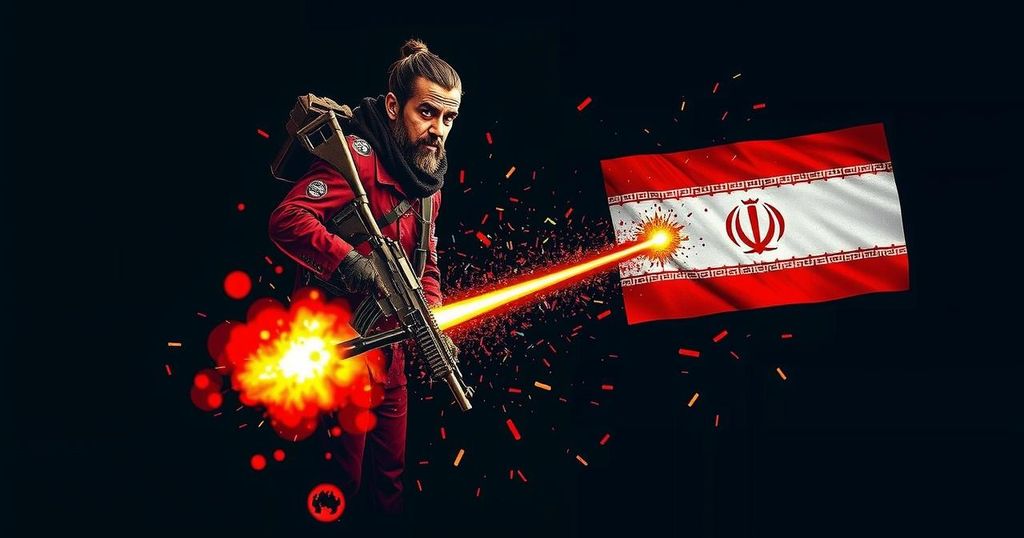Skyrocketing Iran-Linked Attacks on U.S. Forces Post-Hamas Assault on Israel
Attacks against the U.S. by Iran-linked groups have surged by 630% since the Hamas attack on Israel on October 7, 2023. This trend follows a period of increased hostility after the U.S. left the Iran nuclear deal. The JINSA report highlights that Iran-backed groups have launched numerous attacks against U.S. forces in Iraq and Syria as a response to Israel’s military actions against Hezbollah. U.S. military engagements aim to deter these threats while maintaining operational security.
Reports indicate that assaults against the United States by Iran-linked entities have surged dramatically, with a staggering 630% increase observed following the Hamas attack on Israel on October 7, 2023. Data compiled by the Jewish Institute for National Security of America (JINSA) reveals a concerning trend where malign actions, including cyber intrusions, maritime aggression, and physical assaults, have intensified. The escalation began after the U.S.’s 2018 withdrawal from the Iran nuclear agreement, with significant spikes noted since President Biden’s assumption of office. The ongoing conflict in the Middle East, particularly involving Israel, Hamas, and Hezbollah, has further exacerbated the situation. As Israel increases its military actions against Hezbollah in Lebanon, Iranian-backed factions have retaliated by intensifying assaults against U.S. forces in Iraq and Syria. According to Ari Cicurel, JINSA’s assistant director of foreign policy, recent increases include at least 204 assaults involving more than 330 rockets, missiles, and drones targeted at U.S. personnel since mid-October 2023. Militia groups, assumed to be backed by Iranian influence, have doubled their attacks against American forces, utilizing various strategies to maximize damage while minimizing direct confrontations with U.S. forces. This recent uptick in hostilities is a clear indication of Iran’s strategy to protect its interests against actions perceived by its proxies as aggressive. Furthermore, Iran’s operational tactics have shifted to involve Iraqi proxies firing on Israel, avoiding direct retaliation for actions against Iranian territory. The U.S. response remains focused on neutralizing threats from Iran-backed factions, as indicated by targeted strikes on weapon storage facilities and militant locations. Although the Pentagon has acknowledged attacks on U.S. vessels by Houthi forces in Yemen, they maintain operational security regarding the exact nature of threats and responses. The situation continues to evolve, underscoring increasing tensions between Iranian forces, their proxies, and U.S. military presence in the region.
The recent surge in attacks against the United States by Iranian-backed factions is deeply rooted in the geopolitical landscape of the Middle East, particularly following significant events like the 2018 U.S. withdrawal from the Iran nuclear deal. The Hamas attack on Israel on October 7, 2023, has been pivotal, sparking an aggressive response from Iran-aligned groups targeting not only Israel but also U.S. military personnel and assets in Iraq and Syria. The historical context of U.S.-Iran relations and the ongoing conflict with various militant groups contribute to this heightened hostility.
In summary, the 630% increase in Iran-linked attacks against U.S. forces since October 2023 reflects a troubling escalation in regional tensions. The volatile situation is exacerbated by Iran’s efforts to utilize proxies to retaliate against perceived threats, particularly from Israel and the U.S. The ongoing military strategies employed by Iranian-backed groups and the U.S. responses indicate a complex and rapidly evolving conflict landscape that necessitates close monitoring and strategic responses from U.S. leadership and its allies.
Original Source: www.foxnews.com




Post Comment